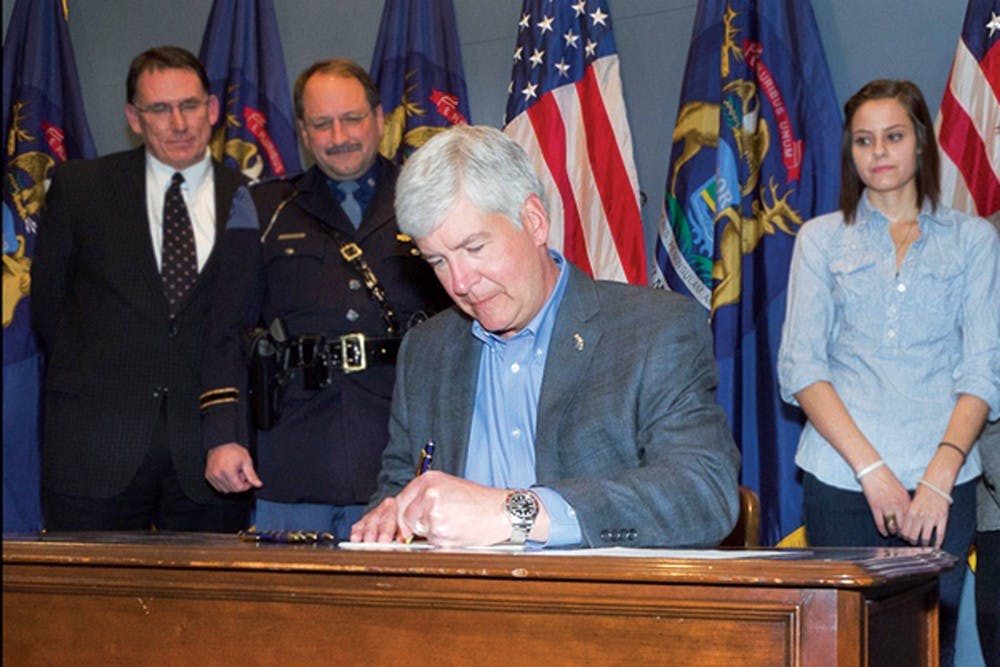School officials, Snyder concerned with higher education before election

Just weeks before the November general election, Gov. Rick Snyder said his priorities lie with higher education.
Higher education is significant for job creation, Snyder said, and to keep young professionals in the state to work and live.
“It’s an important area we need to invest in,” Snyder told Central Michigan Life during a conference call with state-wide student media. “(Students) are our future. We want to make higher education more affordable for people because we want to make it more affordable for people to get the training and skills they need to stay here in Michigan.”
Snyder explained that during his term as governor, the state has created more than 300,000 private sector jobs.
He said he hopes to create an environment where families will continue to live and work in Michigan, mentioning Detroit, Grand Rapids and Ann Arbor, as cities students are “excited” to live and work in after college.
Focusing on community colleges and vocational schools, Snyder said dual enrollment with these schools and universities would save students tuition dollars.
“Dual enrollment is the single biggest saver,” he said. “I’ve been working with community colleges to also boost financial aid. We all have to do our part to contain costs.”
Taking office in 2011, Snyder said Michigan faced a $1 billion deficit. The legislature had to cut higher education funding by about 20 percent. In the following years, he said he has continued to increase funding, hoping to return appropriations to where when he began his first term.
“We had to make some cuts to higher education in that first year,” Snyder said. “This year, university officials are pleased with the increase in funding. We’ve been able to add a lot more revenue to this year.”
Officials at Central Michigan University hope higher education can return to the level of funding it once had.
Kathleen Wilbur, vice president of development and external relations, said Snyder must continue to increase support for higher education as he has in recent years.
“We didn’t want higher education to be on the chopping block (in 2011), but it was,” she said. “(Snyder) has been paying back that cut. With the support of the people, and the legislature, we’ll get back to where we were.
The parameters for determining how much funding each university receives benefitted CMU, Wilbur said.
“Under this current set of metrics, we have done well," Wilbur said "I assume if Snyder is re-elected, we’ll use those same metrics. If his opponent wins, I don’t know if we’ll even have metrics.”
After CMU saw a 15 percent decline in state appropriations for the 2011-12 academic year, down $11,985,000 from 2010-11’s total of $80,064,200, funding has grown steadily each year after.
Appropriations increased by $2.6 million in 2012-13, and then by $2.8 million in 2013-14. This year, state appropriations increased by $5.6 million, bringing the total to about $79 million just under $1 million less than the total before Snyder’s initial cut.
Student political groups at CMU said higher education is an essential component of the governor race this year. President of CMU’s College Democrats Sam McNerney said Snyder does not value higher education, merely using it as a topic to get student votes.
“Gov. Snyder sees (higher education) as something he can use as a priority to get students to vote," McNerney said. "Based on the actions of his office, it’s clear it’s not a priority.”
Citing the 2011 cut to state appropriations, McNerney said the subsequent increases are not adding up. He said Snyder’s priorities are with special interests such as big business and competing with other states.
Looking at 2012, when Snyder passed the right-to-work law making membership in worker unions not mandatory, McNerney said Snyder’s priorities are not for education or the middle class.
“He only cares about the one percent, and dismantling the middle class,” McNerney said. “For a strong middle class, education is essential. With right to work, it is clear he doesn’t care about the middle class, so education cannot be a priority.”
Education will be the “deciding factor” in this year’s election, McNerney said, hoping Michigan will vote Former Congressman Mark Shauer into office.
“Michigan will give a ‘no’ to Snyder. That will usher in Shauer, who’s more in touch with the middle class and students,” McNerney said. “The increases are just not adding up, and that’s why getting students out to vote is going to be so essential.”
President of CMU’s College Republicans Ottorino Schincariol said Snyder would get re-elected to keep appropriations growing, and support for universities moving forward.
“Snyder will get re-elected,” he said. “He’ll win because he has a lot in the these past four years, and he’ll keep propelling Michigan forward. He balanced the budget, that was a huge thing.”
The college-age generation is imperative to Michigan’s future, Schincariol said, and Snyder’s priorities will continue to reflect that if he is re-elected.
“It’s a huge thing for him to look at,” he said. “We’re the next generation. We’re going to be the leaders. There’s a lot that older generations are worried about us, but our generation has huge potential, and higher education is important to that.”
Both the College Democrats and Republicans are volunteering in the weeks before the election to encourage students to register and vote. Democrats, McNerney said, will be registering students on campus and even providing rides to the polling places.
College Republicans are working at their county GOP office, along with encouraging students to join their meetings, regardless of affiliation.
“We’d love to see everyone on campus be a part of a political group,” Schincariol said. “Students need to make their own opinion, and be educated on who to vote for.”



